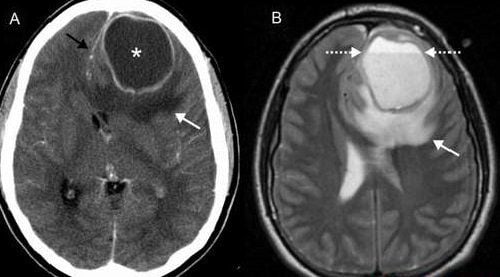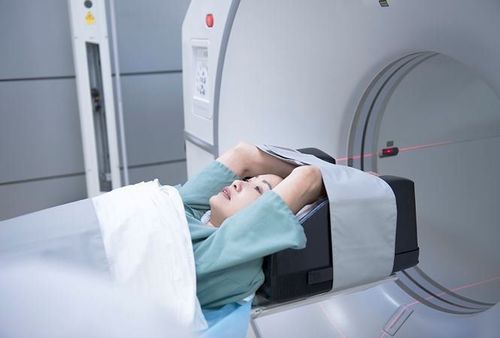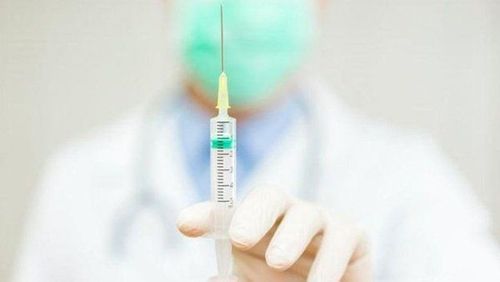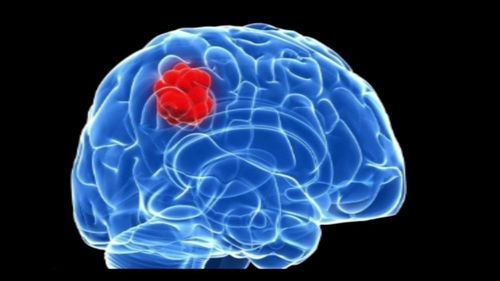This is an automatically translated article.
The article was professionally consulted by BSCK II Le Nghiem Bao - Deputy Head of General Surgery Department - General Surgery Department, Vinmec International General Hospital Da Nang.Brain abscess is a dangerous disease that anyone can experience. If brain abscess is not diagnosed and treated promptly, the patient can die from abscess rupture or other dangerous complications.
1. What is a brain abscess?
A brain abscess is a condition in which pus forms in the brain tissue. Purulent brain affects the entire functioning of the central nervous system, causing a high mortality rate.The brain is the organ that controls all the movements of the body. The brain itself is protected by the cranium, surrounding tissues and the immune system, however, many bacteria and certain organisms can bypass this protection and attack the brain, causing a condition. infection. The brain then responds to the invasion of bacteria by forming small empty spaces containing pus, forming a brain abscess.

Áp xe não là tình trạng hình thành mủ trong mô não
2. Causes of brain abscess
The cause of brain abscess may be due to:Inflammatory lesions in the vicinity, creating conditions for bacteria to attack the brain such as: mastoid otitis, otitis media, sinusitis, and facial infections. or scalp, tooth abscess or cardiovascular diseases... Complications after open traumatic brain injury, brain surgery... Although brain abscess is a rare disease, anyone can get it. The highest incidence of brain abscess is in people between the ages of 30 and 45.
Factors that increase the risk of brain abscess include:
Trauma to the head area An infection near the head such as: ears, nose, nose, face Having diabetes or chronic diseases Having an illness Congenital heart Meningitis Patients who abuse drugs Patients with weak or weakened immune systems such as people with cancer, people with serious illnesses, people with HIV AIDS...
3. Signs of brain abscess
Signs of brain abscess in each case vary depending on the extent and severity of the disease. Some cases of brain abscess develop slowly, in some cases the disease progresses very quickly, causing severe brain damage. Usually, brain abscess includes 3 main signs as follows:Infectious syndrome: the patient has signs of high fever from 39 - 40 degrees Celsius. High fever appears when the abscess is in the diffuse stage. When the abscess is localized, the patient will have less fever. In addition, the patient also has a feeling of fatigue, loss of appetite, dry lips, dirty tongue, rapid weight loss. Intracranial pressure syndrome: dull headache, pain spreading all over the head, especially in the area where the abscess is located. reside. The headache is worse at night or when the patient changes position. Accompanied by a feeling of nausea, vomiting, vomiting. The longer the disease is left, the higher the intracranial pressure increases, the more the patient vomits, uncontrolled vomiting, papilledema, mental retardation, confusion, disorientation, communication difficulties, convulsions, even coma... Focal neurological syndrome: If the abscess is in one hemisphere, the patient will be hemiplegic. If the abscess is on both hemispheres, the patient will be quadriplegic. Cranial nerves Have partial seizures

Chụp CT để chẩn đoán và điều trị áp xe não
4. Treatment of brain abscess
The diagnosis of brain abscess is based on the signs of brain abscess that the patient encounters and the results of CT or magnetic resonance imaging of the brain.The treatment process for brain abscess depends on the location of the localized abscess, the size and number of abscesses as well as the patient's health. Depending on each case, medical treatment alone or in combination with surgical treatment and treatment of the cause of the disease is applied.
Medical treatment alone includes the use of antibiotics with high diffusibility, overcoming the protective barrier of the brain. The patient will be on high-dose antibiotics for a long time, depending on the results of the antibiogram. Take antibiotics as an injection and switch to oral form. During the treatment, the patient needs to be continuously monitored, computed tomography (CT) or magnetic resonance imaging (MRI) of the brain every 3-4 days to check the progress of the disease until clinical symptoms appear. improved medicine. If the use of antibiotics has not obtained effective treatment, the patient will be combined with surgical treatment by surgery, aspiration of the abscess, drainage and complete removal of the abscess. If the abscess is in a deep location, aspiration should be performed. If the abscess is in a shallow position, is larger than 3cm in size and has only one, surgical surgery can be applied. With cases of brain abscess due to complications from surgery or diseases such as otitis media, sinusitis, tooth abscess... the patient needs to be combined with the treatment of these diseases to destroy the root cause. cause disease Treating brain abscess in combination with rest, have a reasonable diet... When there are signs of brain abscess, especially when the patient is in the group of people at high risk for the disease, it is necessary to Go to the doctor as soon as possible. Timely treatment of brain abscess can reduce the risk of later complications, reduce mortality.
The hospital is fully equipped with modern medical machines and equipment, and the most advanced imaging equipment to support diagnosis and treatment such as: G.E 3.0 MRI (MRI) scanner, Toshiba 640 CT SCAN slices, cerebral angiography, MRA and CTA...for clear image quality, easy diagnosis and treatment of brain and spine pathologies of both medical and surgical pathology (brain tumor, degenerative disease). brain degeneration, white matter degeneration, congenital diseases of brain structure, traumatic brain injury, spinal cord injury, cerebrovascular diseases: aneurysms and cerebrovascular malformations...) treated by a team of qualified and experienced medical doctors, especially Specialist II Le Nghiem Bao - Deputy Head of General Surgery Department, Vinmec Danang International Hospital. With a thickness of 30 With years of experience in neurosurgery, Dr. Bao used to teach at Da Nang hospital, which will help the treatment of traumatic brain injury effectively, minimizing the sequelae. Patients are treated and recovered in modern wards, fully equipped with international standards, helping patients feel comfortable, providing maximum support for the treatment process.
Please dial HOTLINE for more information or register for an appointment HERE. Download MyVinmec app to make appointments faster and to manage your bookings easily.













